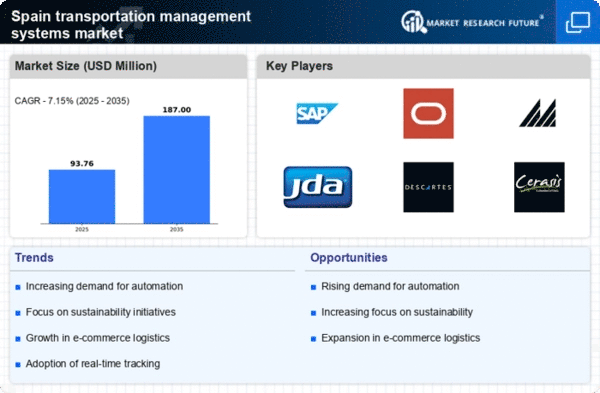E-commerce Growth
The rapid expansion of e-commerce in Spain is a pivotal driver for the transportation management-systems market. As online shopping continues to gain traction, logistics and supply chain efficiency become paramount. In 2025, e-commerce sales in Spain are projected to reach approximately €50 billion, necessitating advanced transportation management systems to handle increased order volumes and optimize delivery routes. This growth compels businesses to adopt sophisticated solutions that enhance visibility, reduce costs, and improve customer satisfaction. Consequently, the transportation management-systems market is likely to experience heightened demand as companies seek to streamline operations and meet the expectations of a digitally savvy consumer base.
Urbanization Trends
The ongoing urbanization in Spain is reshaping transportation dynamics, thereby influencing the transportation management-systems market. With over 80% of the population residing in urban areas, the demand for efficient logistics solutions is intensifying. Urban congestion and the need for last-mile delivery solutions are critical challenges that businesses face. Transportation management systems can facilitate route optimization and resource allocation, addressing these urban challenges effectively. As cities continue to grow, the market for transportation management systems is expected to expand, providing innovative solutions to navigate the complexities of urban logistics.
Regulatory Compliance
Stringent regulations surrounding transportation and logistics in Spain are driving the adoption of transportation management-systems. Compliance with environmental standards, safety regulations, and labor laws necessitates the implementation of robust management systems. In 2025, it is estimated that compliance-related costs could account for up to 15% of total logistics expenses. As companies strive to avoid penalties and enhance operational efficiency, the transportation management-systems market is positioned to benefit. These systems provide tools for monitoring compliance, ensuring that businesses can adapt to changing regulations while maintaining operational integrity and efficiency.
Cost Optimization Pressure
The pressure to optimize costs is a critical driver for the transportation management-systems market in Spain. Companies are increasingly focused on reducing logistics expenses, which can account for a significant portion of overall operational costs. In 2025, logistics costs in Spain are projected to represent around 10% of GDP, prompting businesses to seek solutions that enhance efficiency and reduce waste. Transportation management systems offer tools for analyzing transportation costs, improving route planning, and minimizing fuel consumption. As organizations strive to maintain profitability in a competitive landscape, the demand for effective transportation management systems is expected to rise.
Technological Advancements
Technological advancements are significantly impacting the transportation management-systems market in Spain. The integration of artificial intelligence, machine learning, and IoT technologies is enhancing the capabilities of transportation management systems. These innovations enable real-time tracking, predictive analytics, and automated decision-making processes. In 2025, it is anticipated that the adoption of AI-driven solutions could increase operational efficiency by up to 30%. As businesses seek to leverage these technologies to gain a competitive edge, the transportation management-systems market is likely to witness substantial growth, driven by the demand for smarter, more efficient logistics solutions.
















